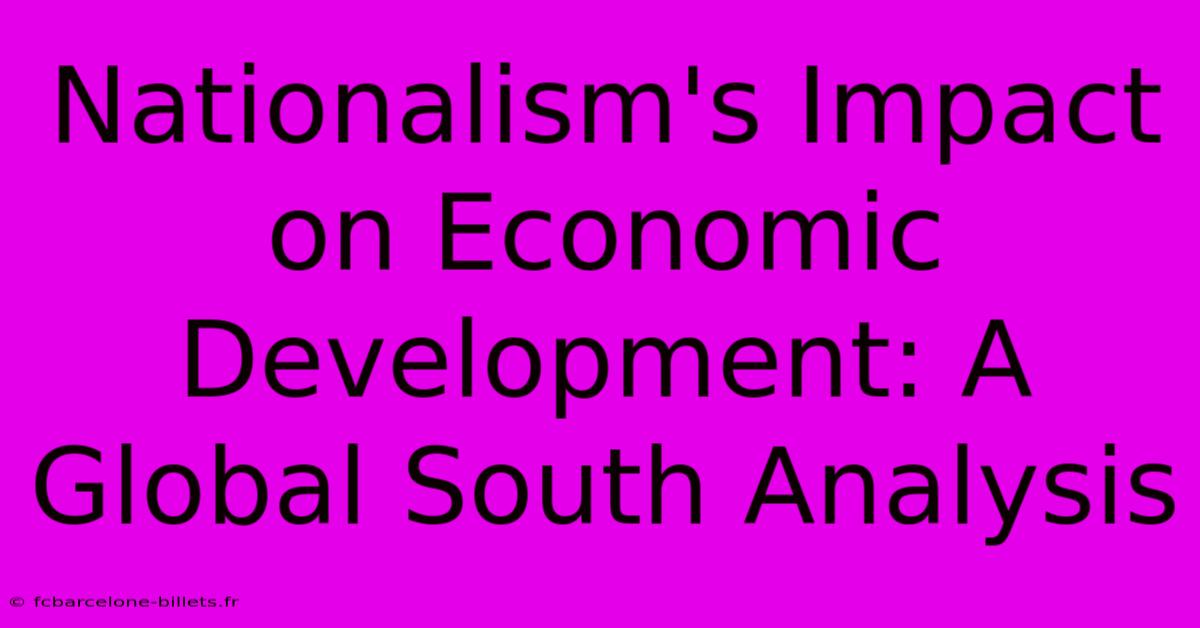Nationalism's Impact On Economic Development: A Global South Analysis

Table of Contents
Nationalism's Impact on Economic Development: A Global South Analysis
Nationalism, a potent force shaping global politics, wields a complex and often contradictory influence on economic development, particularly within the Global South. While fervent national pride can fuel economic growth through unity and protectionist policies, it can also stifle progress by hindering international cooperation and fostering internal conflict. This analysis delves into the multifaceted relationship between nationalism and economic development in the Global South, examining both its positive and negative manifestations.
The Double-Edged Sword of Nationalist Economic Policies
Nationalist economic policies, often rooted in a desire for self-reliance and independence from foreign influence, can manifest in several ways. Import substitution industrialization (ISI), a strategy popular in the mid-20th century, aimed to reduce reliance on imports by developing domestic industries. While some countries experienced initial success, many faced challenges due to inefficient industries sheltered from competition and a lack of technological advancement.
Protectionism, another common manifestation, involves using tariffs and other barriers to shield domestic industries from foreign competition. While it can offer short-term protection and boost certain sectors, it can also lead to higher prices for consumers, reduced efficiency, and retaliation from other countries, ultimately hindering long-term economic growth.
Case Studies: Successes and Failures
The success or failure of nationalist economic policies often depends on various factors, including the country's specific context, the effectiveness of implementation, and the global economic environment.
South Korea's remarkable economic growth, often cited as a success story, involved a blend of state-led industrial policy and strategic engagement with the global economy. While national pride played a crucial role in driving its development, it wasn't solely reliant on protectionism. Instead, it fostered a dynamic export-oriented strategy, selectively adopting global technologies and integrating into the international trading system.
In contrast, many Latin American countries that adopted ISI strategies experienced limited success. High levels of protectionism led to inefficiencies, technological stagnation, and a dependence on state subsidies, hindering long-term competitiveness and economic diversification.
Nationalism and Regional Integration: A Complex Relationship
Nationalism can also impact economic development through its influence on regional integration efforts. While some nationalist movements prioritize national interests above regional cooperation, hindering the creation of larger, more integrated markets, others utilize nationalism as a catalyst for regional collaboration. The African Union's efforts to promote economic integration among African nations illustrate the potential of harnessing nationalist sentiment to forge stronger regional economic blocs.
Challenges to Regional Cooperation
However, deep-seated national rivalries and historical grievances can hinder regional cooperation. Nationalist sentiments can fuel protectionist policies at the regional level, negating the potential benefits of free trade and economic integration. The persistent obstacles to complete economic integration within various regional blocs in the Global South highlight the challenges posed by nationalism to regional development.
The Internal Impact: Social Cohesion and Conflict
Nationalist fervor, while sometimes unifying, can also exacerbate internal social and ethnic tensions. When national identity is constructed around exclusionary principles, it can lead to discrimination, marginalization, and conflict, hindering economic development by disrupting social stability and investment. The economic consequences of internal conflicts, displacement, and loss of human capital can be devastating, particularly for nations already grappling with economic challenges.
Conclusion: Navigating the Nationalist Tide
The impact of nationalism on economic development in the Global South is multifaceted and highly context-dependent. While it can foster national unity and promote certain sectors, it can also lead to inefficiencies, protectionism, and conflict, stifling long-term growth. Successfully navigating the complexities of nationalism requires a nuanced approach that balances national pride and self-reliance with international cooperation, inclusive policies, and a commitment to regional integration. The key lies in harnessing the positive aspects of nationalism—national unity and a commitment to progress—while mitigating its potentially destructive effects. This requires careful consideration of each nation's unique circumstances and a commitment to fostering inclusive and sustainable economic growth.

Thank you for visiting our website wich cover about Nationalism's Impact On Economic Development: A Global South Analysis. We hope the information provided has been useful to you. Feel free to contact us if you have any questions or need further assistance. See you next time and dont miss to bookmark.
Featured Posts
-
Figueres To Barcelona A Travelers Tale
Apr 02, 2025
-
Maison Close Barcelona A Night Of Sensual Discovery
Apr 02, 2025
-
Barcelona 2024 Kit The Official Launch Is Here
Apr 02, 2025
-
Barcelona Calling Understanding Madrid Flight Times
Apr 02, 2025
-
Discover Andorras History A Barcelona Based Tour
Apr 02, 2025
